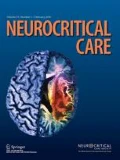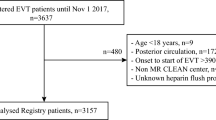Abstract
Background
Abciximab is being used as an adjunct to neuroendovascular procedures both to prevent and treat ischemic sequelae. Experience with abciximab in this setting is limited; major bleeding complications, including fatal intracranial hemorrhage (ICH), are of particular concern. We report our multicenter experience with ICH following the administration of abciximab during neuroendovascular procedures.
Methods
We identified neuroendovascular procedures (including cerebral angiograms, aneurysm coiling procedures, angioplasty/vascular stenting procedures, and emergent revascularization procedures) that used abciximab at Mayo Clinic Hospitals in Rochester, Jacksonville, and Phoenix between November 2000 and April 2009. Cases of periprocedural ICH were identified and pertinent demographic, historical, procedural, radiographic, and laboratory data were collected. Clinical outcome was measured either at death or discharge by the Glasgow Outcome Scale (GOS).
Results
Abciximab was used in 51 neuroendovascular procedures; 9 cases of ICH were identified. Procedures performed and indications for abciximab use varied. Route of abciximab administration included IV bolus only (n = 4), IA bolus followed by IV infusion (n = 3), IV bolus followed by IV infusion (n = 1), and IV infusion without preceding bolus (n = 1). All but 1 of the patients received concomitant periprocedural antiplatelet, anticoagulant, or thrombolytic agents. Eight of the 9 cases of ICH were detected within 7 h of abciximab administration. ICH pattern varied. Four patients died following ICH.
Conclusions
Adjunctive use of abciximab to prevent or treat ischemic sequelae during neuroendovascular procedures is associated with a high risk of ICH (18%). We report 9 cases of ICH associated with abciximab administration during neuroendovascular procedures with 44% mortality.

Similar content being viewed by others
Abbreviations
- ACT:
-
Activated clotting time
- EVD:
-
External ventricular drain
- GOS:
-
Glasgow outcome scale
- GP IIb/IIIa:
-
Glycoprotein IIb/IIIa
- GPI:
-
Glycoprotein IIb/IIIa receptor inhibitor
- IA:
-
Intra-arterial
- ICH:
-
Intracranial hemorrhage
- IPH:
-
Intraparenchymal hemorrhage
- IV:
-
Intravenous
- IVH:
-
Intraventricular hemorrhage
- kg:
-
Kilograms
- mg:
-
Milligrams
- mcg:
-
Micrograms
- min:
-
Minutes
- ml:
-
Milliliters
- PCI:
-
Percutaneous coronary intervention
- PTT:
-
Partial thromboplastin time
- r-tPA:
-
Recombinant tissue plasminogen activator
- SAH:
-
Subarachnoid hemorrhage
- SDH:
-
Subdural hemorrhage
References
The EPIC Investigators. Use of a monoclonal antibody directed against the platelet glycoprotein IIb/IIIa receptor in high-risk coronary angioplasty. N Engl J Med. 1994;330:956–61.
Mascelli MA, Lance ET, Damaraju L, Wagner CL, Weisman HF, Jordan RE. Pharmacodynamic profile of short-term abciximab treatment demonstrates prolonged platelet inhibition with gradual recovery from GP IIb/IIIa receptor blockade. Circulation. 1998;97:1680–8.
Tcheng JE, Ellis SG, George BS, et al. Pharmacodynamics of chimeric glycoprotein IIb/IIIa integrin antiplatelet antibody Fab 7E3 in high-risk coronary angioplasty. Circulation. 1994;90:1757–64.
Topol EJ. Reperfusion therapy for acute myocardial infarction with fibrinolytic therapy or combination reduced fibrinolytic therapy and platelet glycoprotein IIb/IIIa inhibition: the GUSTO V randomised trial. Lancet. 2001;357:1905–14.
The EPISTENT Investigators. Randomised placebo-controlled and balloon-angioplasty-controlled trial to assess safety of coronary stenting with use of platelet glycoprotein-IIb/IIIa blockade. Lancet. 1998;352:87–92.
The CAPTURE Investigators. Randomised placebo-controlled trial of abciximab before and during coronary intervention in refractory unstable angina: the CAPTURE study. Lancet. 1997;349:1429–35.
The EPILOG Investigators. Platelet glycoprotein IIb/IIIa receptor blockade and low-dose heparin during percutaneous coronary revascularization. N Engl J Med. 1997;336:1689–96.
Levy EI, Mehta R, Gupta R, et al. Self-expanding stents for recanalization of acute cerebrovascular occlusions. AJNR Am J Neuroradiol. 2007;28:816–22.
Qureshi AI, Saad M, Zaidat OO, et al. Intracerebral hemorrhages associated with neurointerventional procedures using a combination of antithrombotic agents including abciximab. Stroke. 2002;33:1916–9.
Qureshi AI, Suri MF, Khan J, Fessler RD, Guterman LR, Hopkins LN. Abciximab as an adjunct to high-risk carotid or vertebrobasilar angioplasty: preliminary experience. Neurosurgery. 2000;46:1316–25.
Velat GJ, Burry MV, Eskioglu E, Dettorre RR, Firment CS, Mericle RA. The use of abciximab in the treatment of acute cerebral thromboembolic events during neuroendovascular procedures. Surg Neurol. 2006;65:352–9.
Park JH, Kim JE, Sheen SH, et al. Intraarterial abciximab for treatment of thromboembolism during coil embolization of intracranial aneurysms: outcome and fatal hemorrhagic complications. J Neurosurg. 2008;108:450–7.
Chan AW, Yadav JS, Bhatt DL, et al. Comparison of the safety and efficacy of emboli prevention devices versus platelet glycoprotein IIb/IIIa inhibition during carotid stenting. Am J Cardiol. 2005;95:791–5.
Jones RG, Davagnanam I, Colley S, West RJ, Yates DA. Abciximab for treatment of thromboembolic complications during endovascular coiling of intracranial aneurysms. AJNR Am J Neuroradiol. 2008;29:1925–9.
Aviv RI, O’Neill R, Patel MC, Colquhoun IR. Abciximab in patients with ruptured intracranial aneurysms. AJNR Am J Neuroradiol. 2005;26:1744–50.
Gralla J, Rennie AT, Corkill RA, et al. Abciximab for thrombolysis during intracranial aneurysm coiling. Neuroradiology. 2008;50:1041–7.
Song JK, Niimi Y, Fernandez PM, et al. Thrombus formation during intracranial aneurysm coil placement: treatment with intra-arterial abciximab. AJNR Am J Neuroradiol. 2004;25:1147–53.
Mounayer C, Piotin M, Baldi S, Spelle L, Moret J. Intraarterial administration of Abciximab for thromboembolic events occurring during aneurysm coil placement. AJNR Am J Neuroradiol. 2003;24:2039–43.
Adams HP Jr, Effron MB, Torner J, et al. Emergency administration of abciximab for treatment of patients with acute ischemic stroke: results of an international phase III trial: Abciximab in Emergency Treatment of Stroke Trial (AbESTT-II). Stroke. 2008;39:87–99.
Vahdat B, Canavy I, Fourcade L, et al. Fatal cerebral hemorrhage and severe thrombocytopenia during abciximab treatment. Catheter Cardiovasc Interv. 2000;49:177–80.
Jennett B, Bond M. Assessment of outcome after severe brain damage. Lancet. 1975;1:480–4.
Coller BS. A new murine monoclonal antibody reports an activation-dependent change in the conformation and/or microenvironment of the platelet glycoprotein IIb/IIIa complex. J Clin Invest. 1985;76:101–8.
Reverter JC, Beguin S, Kessels H, Kumar R, Hemker HC, Coller BS. Inhibition of platelet-mediated, tissue factor-induced thrombin generation by the mouse/human chimeric 7E3 antibody. Potential implications for the effect of c7E3 Fab treatment on acute thrombosis and “clinical restenosis”. J Clin Invest. 1996;98:863–74.
Tcheng JE. Clinical challenges of platelet glycoprotein IIb/IIIa receptor inhibitor therapy: bleeding, reversal, thrombocytopenia, and retreatment. Am Heart J. 2000;139:S38–45.
Akkerhuis KM, Deckers JW, Lincoff AM, et al. Risk of stroke associated with abciximab among patients undergoing percutaneous coronary intervention. JAMA. 2001;286:78–82.
Ries T, Siemonsen S, Grzyska U, Zeumer H, Fiehler J. Abciximab is a safe rescue therapy in thromboembolic events complicating cerebral aneurysm coil embolization: single center experience in 42 cases and review of the literature. Stroke. 2009;40:1750–7.
Acknowledgments
A portion of the preliminary data was presented in poster form at the Society of Vascular and Interventional Neurology annual meeting in Miami, FL, October 2008; as an oral presentation at the Florida Society of Neurology annual meeting in Orlando, FL, September 2009; and in poster form at the Neurocritical Care Society annual meeting in New Orleans, LA, November 2009. The authors wish to thank Ms. Katherine Purcell for her editorial assistance in preparing this manuscript.
Conflicts of interest statement
The authors report no conflicts of interest or pertinent financial disclosures.
Author information
Authors and Affiliations
Corresponding author
Additional information
Commercial products: Reopro® (Abciximab) by Eli Lilly, Indianapolis, IN.
Rights and permissions
About this article
Cite this article
Walsh, R.D., Barrett, K.M., Aguilar, M.I. et al. Intracranial Hemorrhage Following Neuroendovascular Procedures with Abciximab is Associated with High Mortality: A Multicenter Series. Neurocrit Care 15, 85–95 (2011). https://doi.org/10.1007/s12028-010-9338-1
Published:
Issue Date:
DOI: https://doi.org/10.1007/s12028-010-9338-1



